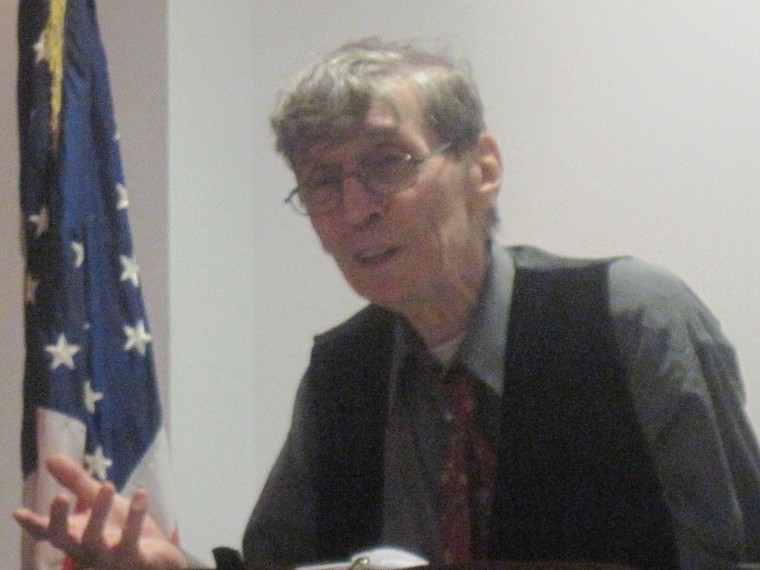For veteran actor Ed Dennehy, portraying legendary defense attorney Clarence Darrow in a recent performance at the Mineola Memorial Library was a kind of homecoming.
Dennehy, 64, was raised in Mineola with his older brothers Mike and Brian, the well-known dramatic actor.
Ed Dennehy attended the St. Aidan and Corpus Christi schools, and Chaminade during his formative years, and had his first parts in plays while attending grade school and high school.
Dennehy spent the summer before his sophomore year at Chaminade working at the Mineola Playhouse and taking an acting class there. He vividly remembers watching Sammy Davis Jr. in the principal role of “The Desperate Hours,” playing an escaped convict who masterminds the kidnapping of a family.
“I fell in love with this play – and idea of playing gangster,” Dennehy recalled.
When he went back to Chaminade in September, the school’s fall production was “The Desperate Hours,” and Dennehy landed the part he had seen Davis play during the preceding summer.
Playing that role was what hooked him on a life in the theater.
“Once I did it, I said, ‘This is it. I love this. It loves me’,” he said. “I was a pretty damn good actor. I didn’t know it yet.”
Dennehy also vividly recalls playing Rif in a St. Aidan summer theater production of “West Side Story,” directed by his brother Brian at the old Mineola High School the following summer.
Dennehy developed a two-person show based on David Rintels’ “Clarence Darrow,” which had originally seen a brief run on Broadway starring Henry Fonda in 1974.
He was joined in the performance by Sheila Rettaliata, who played a number of supporting roles.
Dennehy’s version of the play conveyed a full portrait of the man best known for his defense of Tennessee teacher John Scopes in the 1925 trial that tested the right to teach Charles Darwin’s theory of evolution in violation of state law.
Darrow’s public persona in the contemporary public imagination is informed by that confrontation with William Jennings Bryan as portrayed in the film “Inherit the Wind.”
But there was much more to Darrow’s career than that. And Dennehy personified Darrow as the man of contradictions that he was, beginning with his motivation for practicing law.
“The law is a bum profession, devoid of ideals,” Dennehy as Darrow told a small audience at the Mineola library. “The truth is, I was fascinated by law, the clash of good minds. Hell, it was better than baseball.”
Darrow’s defended anarchists who were accused of murder in the Haymarket Riot of May 4, 1886 and subsequently became Chicago corporation counsel in 1890, trying cases against railroad companies. Then he took a job representing the Chicago North Western Railroad, but soon left the railroad to defend Eugene V. Debs, president of the American Railway Union, and other union leaders arrested on a federal charge of contempt of court arising from the Pullman Strike.
It was these apparent contradictions about Darrow that drew Dennehy to him.
“The more I studied about him, the more I was fascinated by the dichotomies about him. Every time I do it, I discover something different in it,” said Dennehy, who has portrayed Darrow “on and off” for 30 years and is currently developing a three-actor version of the play.
Darrow’s strong sense of social justice about the Pullman Strike rang through Dennehy’s words: “If a man even talked about joining the union, he lost his job, his family was thrown out of their home and his name was blacklisted among all the railroads in the country.”
Darrow abandoned labor litigation after 17 years when two labor leaders whom he defended against charges of dynamiting the Los Angeles Times building, switched their plea to guilty on Darrow’s advice during the course of their 1911 trial, a trial in which Darrow was accused of jury tampering.
“The evil men do – and even the evil they don’t do – lives on beyond them,” Dennehy, as Darrow, said.
One line in the play suffices to explain Darrow’s defense of Richard Loeb and Nathan Leopold for their “thrill” killing of 14-year-old Robert Franks – another episode of the lawyer’s career translated to film: “I never hesitated to defend a man accused of murder, if only to prevent another murder by the state.”
But this same man of such apparently durable moral fiber abandoned his wife of 18 years, portrayed by Dennehy in one of several vignettes with Rettaliata.
The Scopes trial was also part of Dennehy’s script – which he read – recounting some of Darrow’s memorable interrogation of Bryan as an Biblical scripture expert.
Asking about Noah mooring the ark, Darrow asked, “Who’d he throw the rope to?”
And inquiring after the unexplained origin of Cain’s wife, he said, “Where did she come from, the land of Nod or some such place?”



